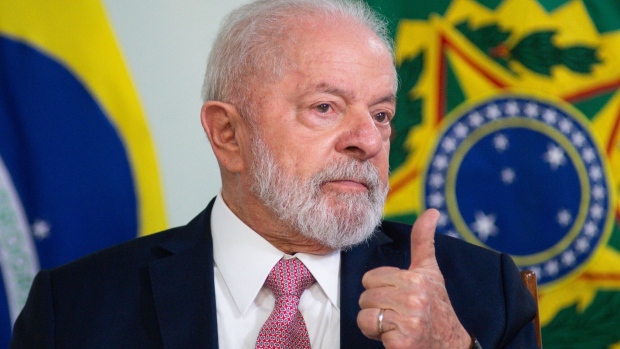Oct 27, 2023
Brazil Unlikely to Hit 2024 Zero-Deficit Target, Lula Says
, Bloomberg News

(Bloomberg) -- Brazil President Luiz Inacio Lula da Silva cast doubt on his government’s ability to hit its own zero-deficit target next year, saying he would not cut spending on priority projects to reach a goal he considers unnecessary.
The government will not “establish a fiscal target that requires us to start the year by cutting billions from projects that are priorities for this country,” Lula told reporters Friday in Brasilia.
The target “doesn’t need to be zero,” he added. “The country doesn’t need it.”
The comments mark a reversal of the government’s fiscal strategy. Until recently, Finance Minister Fernando Haddad was pledging to balance Brazil’s budget next year, a key aspect of his efforts to calm investor fears about the leftist Lula’s plans to boost public spending amid high government indebtedness.
Read More: Brazil Vows to Balance Budget in 2024 - Markets Are Skeptical
Haddad told Bloomberg News in an interview earlier this month that Brazil was on track to hit the goal if congress did its part to help raise the 168 billion reais ($34 billion) in revenues his 2024 budget proposal projects he needs to close the gap.
What Bloomberg Economics Says
“Haddad’s mission of bringing the budget to balance in 2024 was already hard to deliver, but without Lula’s explicit and strong endorsement, it becomes multiple times harder.”
“That shows that Haddad is alone in the pledge for a balanced budget, suggests that he’ll not have support to put expenditures on hold at the onset of the year to improve his odds of meeting the target; and poses questions as to what may happen during the budget process for 2025 - when Haddad will likely be hard pressed by the new fiscal rule to adopt a stricter parameter for spending growth.”
— Adriana Dupita, Brazil economist
The Brazilian real erased gains as traders assessed Lula’s remarks, while a broader index of developing-nation currencies also trimmed its advance amid a souring global mood. Local swap rates climbed, with contracts maturing in January of 2027 surging 17 basis points as of 2:50 p.m. local time.
“I know it’s Haddad’s will, but if Brazil has a deficit of 0.5% or 0.25% of GDP” the difference is “nothing,” Lula said.
The Finance Ministry did not immediately respond to a request for comment. But earlier in the day, National Treasury Secretary Rogerio Ceron said that while Brazil’s fiscal outlook had become more challenging, he remained committed to the balanced budget goal for next year.
“The external scenario has worsened in recent weeks. Indicators point to an economic slowdown in Brazil, and we are monitoring the impacts, but we will continue to seek the best possible fiscal result in 2024,” Ceron said during a news conference.
Read More: Brazil Needs Congress to Fix $33 Billion Budget Gap, Haddad Says
Haddad already faced mounting skepticism about his ability to deliver on the pledge, especially as Brazil’s fiscal scenario has worsened. The primary deficit, which excludes interest payments, was 0.7% of gross domestic product over the past 12 months through September, according to Finance Ministry data. That compares with a 0.5% surplus at the end of 2022.
The Finance Ministry currently projects a deficit of 141.4 billion reais by the end of 2023, while Brazil’s gross debt will reach almost 75% of GDP.
Brazil’s lower house of congress on Wednesday approved legislation to tax exclusive and offshore funds, levies on the wealthiest Brazilians that Haddad has prioritized.
The proposal still needs Senate approval, and Lula’s comments will likely weaken Haddad’s position as he seeks to advance it and other revenue-raising measures through congress, said Antonio Madeira, an economist at MCM Consultores Associados Ltd in Sao Paulo.
Brazil’s economy has outperformed expectations this year. But Lula’s skepticism of the deficit target was accompanied by pessimism about the economy’s future.
China’s slowing growth and high US interest rates, Lula said, will make 2024 “a difficult year.”
“I told Haddad that when we are in government, we are supposed to prevent the disease from spreading,” he said.
--With assistance from Vinícius Andrade, Felipe Saturnino, Bruna Lessa, Maria Eloisa Capurro and Martha Beck.
(Updates with additional market and analyst reaction, comments and context throughout.)
©2023 Bloomberg L.P.








